hairball support

free shipping over $100 (USA & Canada)
1-877-937-4372 the pet expert hotline
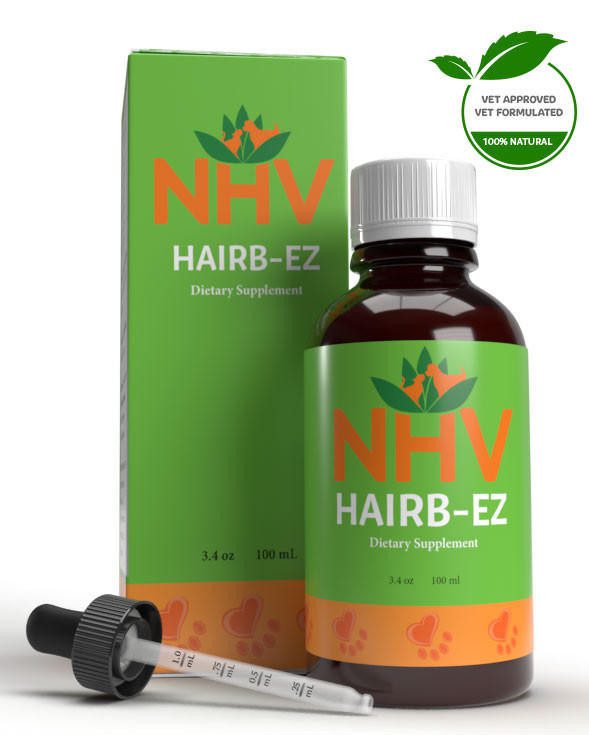
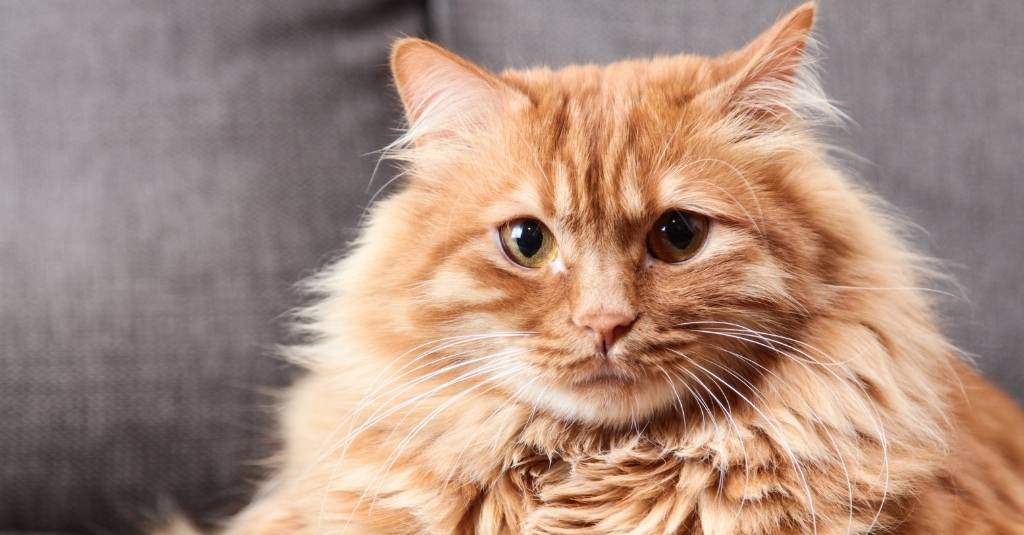
Cat hairballs—that cold, squishy, tubular hairy mass—may be an unpleasant experience for cat owners. Still, cat vomiting due to hairballs is one of the common issues in our holistic veterinary practice. Although not entirely preventable, a caring cat-guardian can do things to reduce the frequency and severity of hairballs in cats.
As your cat routinely grooms himself or herself, they swallow some of the loose hair and debris from their coat. In most cases, the loose fur and debris pass through the digestive tract and come out in the stool. However, some of the hair forms a lump or hairball in the stomach, which your cat will usually vomit up. However, in some cases, hair can remain in the stomach, and if left for a long time, the hairball will harden into a dense mass. This can irritate the stomach and may even block the digestive tract.
In some cases hair can remain in the stomach, and if left for a long time, the hairball will harden into a dense mass. This can irritate the stomach and may even block the digestive tract.
Some long-haired breeds, such as Persians, Ragdolls, and Maine Coons are much more likely to get hairballs, as cats groom themselves compulsively.
No, it’s not the latest dance craze; the “the hairball hack” is that awful coughing sound that cats make when trying to expel that terrible ball of fur. It may be disturbing to watch, but so long as your cat is not in danger, allow them to vomit up the hairball without disturbing or preventing them from doing so.
Although the vomiting can be due to a cat hairball issue, your veterinarian should rule out other major underlying concerns such as:
If you see your cat coughing and no hairball production occurs, it may be likely that your cat has asthma or another issue, and a visit to the vet is recommended.
Diagnosing the underlying problem of why a cat is throwing up requires presenting your veterinarian with a thorough history, including what the cat’s vomitus looks like and how the cat is vomiting. It is always entertaining to watch our clients mimic their cat’s vomiting motions and noises. When bringing a sample of the cat’s vomitus, make sure it is an airtight bag—please!!
1. Brush your kitty. Although not all cats will allow this, it can significantly reduce the number of hairball occurrences. We have found that a fine-toothed flea comb works well for shorthaired cat breeds to remove the undercoat and dead fur. In long-haired cats, use wide-toothed combs.
2. Try the “lion cut”. The “lion cut” is when the fur is shaved down to the skin. Although a little shocking for cat parents, I’m always surprised at how well tolerated the “lion cut” is by the kitties themselves; in fact, they seem to feel fabulous after!
3. Add Fiber to the diet. Try pumpkin or cilium for a natural approach.
4. Cat Hairball Remedies. Supplements like lubricant hairball remedies can help alleviate and prevent hairballs. We prefer products without petroleum. A natural formula, which we use is NHV Hairb-Ez, which helps support the liver in addition to helping to dissolve hairballs.
If your cat is throwing up frequently, and the above techniques and remedies do not help, a trip to the vet is necessary to diagnose any underlying problem.
If you have any question, click on the button below to ask one of the NHV pet experts!
hairball support

Natural Support for Hairballs and Digestive Health
bundle and save with pet expert kits
3 month supply for a small to medium size pet.
If your sweet fur baby is throwing up hairballs, there may be more going on than you may think. Left untreated, hairballs can affect other organs like the liver and kidneys. Give your little one the full support they need with NHV’s Hairball control kit.


If your sweet fur baby is throwing up hairballs, there may be more going on than you may think. Left untreated, hairballs can affect other organs like the liver and kidneys. Give your little one the full support they need with NHV’s Hairball control kit.

Did you know that your furkiddo spends 30% of their waking life grooming? And because of their natural habit, they tend to swallow a lot of hair! Long haired cat breeds like Main Coons, Persians, and Ragdolls are more likely to develop hairballs than their short-haired meow-sins; however, all cats can get them. If the ingested hair cannot get past your kitty's stomach and small intestine, then a hairball will form. NHV Hairball Control Kit contains Hairb-Ez, which helps to dissolve hair buildup, soothe inflammation along the GI tract and improve the motility of undigested matter, while Milk Thistle helps with detoxification, reducing oxidative stress on the liver, and supporting healthy kidney/gallbladder function.
The hacking sound of your kitty retching is pretty unpleasant to witness for any pet parent, but hairballs are a side effect of your cat's constant grooming. Suppose your furry friend is throwing up a hairball more than once a month. In that case, there may be something more serious going on like intestinal motility problems, skin issues, abdomen issues, urinary tract problems, or musculoskeletal concerns. When your kitty is grooming, their tongue is barbed (like a miniature brush), moving loose hair down their throat. Typically, this ingested hair passes through their GI tract and into their litter box. Sometimes, however, the hair can get stuck in their stomach, and they throw this up as hairballs. Hairballs become a problem when your kitty's digestive system can't move the hair through the stomach and intestinal tract at an average speed, leading to a possible blockage and issues with other organs. NHV Hairball Control Kit contains Hairb-Ez and Milk Thistle to help support your kitty's digestive health, organ health and to help pass hairballs naturally.
Hairball Control Kit is a natural healthcare support that aids with dissolving hairballs, improving GI tract health as well as support detoxification and immune function. These liquid supplements with high bioavailability are safe and effective to use alongside other hairball treatments.
At NHV, we are a team of pet experts, vets, and animal lovers. Get in touch with us if you have any questions or concerns about your kitty's unique health concerns.
Made with the finest, organically grown, or ethically harvested herbs. Made specifically for pets, vet-formulated and vet approved.
Hairb-Ez
Milk Thistle
Select your pet's weight to determine the correct dose.
To be taken twice daily. Determine your pet’s weight and then use the easy chart below to determine the correct dose. This is the minimum dosage.
Pet's Weight Dosage
0 - 15 lb = 0.5 ml
16 - 30 lb = 1.0 ml
31 - 45 lb = 1.5 ml
46 - 60 lb = 2.0 ml
61 - 75 lb = 2.5 ml
Over 75 lb = 3.0 ml
For rabbits: 0.5 ml twice a day
How to Administer
Shake well before use. The easiest method is to use the dropper provided and place the drops into your pet’s food or favorite treat. You can also use the dropper and squirt directly into the pet’s mouth. Some pets can be finicky, if this occurs consider hiding the drops in foods most pet’s love such as fish, chicken or yogurt or a favorite treat. If your pet only eats dry food then soak a few kibbles at feeding time.
For Best Results
Herbal dietary supplements are beneficial to the health and well-being of your pet and are safe for long-term use. Every pet responds to natural herbal supplements differently, therefore it is important to be consistent and administer the product daily. Supplements generally take two to four weeks to take effect, however this will vary from one animal to the next.
Product Storage
All NHV Natural Pet Products are pure herbal extracts and contain no artificial additives, preservatives or coloring. Shelf life after opening is 6 months and must be refrigerated after opening.
Cautions and Contraindications
Do not use in pregnant or nursing animals.
All information provided by NHV Natural Pet Products is for educational purposes only.
Did you know that your furkiddo spends 30% of their waking life grooming? And because of their natural habit, they tend to swallow a lot of hair! Long haired cat breeds like Main Coons, Persians, and Ragdolls are more likely to develop hairballs than their short-haired meow-sins; however, all cats can get them. If the ingested hair cannot get past your kitty's stomach and small intestine, then a hairball will form. NHV Hairball Control Kit contains Hairb-Ez, which helps to dissolve hair buildup, soothe inflammation along the GI tract and improve the motility of undigested matter, while Milk Thistle helps with detoxification, reducing oxidative stress on the liver, and supporting healthy kidney/gallbladder function.
The hacking sound of your kitty retching is pretty unpleasant to witness for any pet parent, but hairballs are a side effect of your cat's constant grooming. Suppose your furry friend is throwing up a hairball more than once a month. In that case, there may be something more serious going on like intestinal motility problems, skin issues, abdomen issues, urinary tract problems, or musculoskeletal concerns. When your kitty is grooming, their tongue is barbed (like a miniature brush), moving loose hair down their throat. Typically, this ingested hair passes through their GI tract and into their litter box. Sometimes, however, the hair can get stuck in their stomach, and they throw this up as hairballs. Hairballs become a problem when your kitty's digestive system can't move the hair through the stomach and intestinal tract at an average speed, leading to a possible blockage and issues with other organs. NHV Hairball Control Kit contains Hairb-Ez and Milk Thistle to help support your kitty's digestive health, organ health and to help pass hairballs naturally.
Hairball Control Kit is a natural healthcare support that aids with dissolving hairballs, improving GI tract health as well as support detoxification and immune function. These liquid supplements with high bioavailability are safe and effective to use alongside other hairball treatments.
At NHV, we are a team of pet experts, vets, and animal lovers. Get in touch with us if you have any questions or concerns about your kitty's unique health concerns.
Made with the finest, organically grown, or ethically harvested herbs. Made specifically for pets, vet-formulated and vet approved.
Hairb-Ez
Milk Thistle
Select your pet's weight to determine the correct dose.
To be taken twice daily. Determine your pet’s weight and then use the easy chart below to determine the correct dose. This is the minimum dosage.
Pet's Weight Dosage
0 - 15 lb = 0.5 ml
16 - 30 lb = 1.0 ml
31 - 45 lb = 1.5 ml
46 - 60 lb = 2.0 ml
61 - 75 lb = 2.5 ml
Over 75 lb = 3.0 ml
For rabbits: 0.5 ml twice a day
How to Administer
Shake well before use. The easiest method is to use the dropper provided and place the drops into your pet’s food or favorite treat. You can also use the dropper and squirt directly into the pet’s mouth. Some pets can be finicky, if this occurs consider hiding the drops in foods most pet’s love such as fish, chicken or yogurt or a favorite treat. If your pet only eats dry food then soak a few kibbles at feeding time.
For Best Results
Herbal dietary supplements are beneficial to the health and well-being of your pet and are safe for long-term use. Every pet responds to natural herbal supplements differently, therefore it is important to be consistent and administer the product daily. Supplements generally take two to four weeks to take effect, however this will vary from one animal to the next.
Product Storage
All NHV Natural Pet Products are pure herbal extracts and contain no artificial additives, preservatives or coloring. Shelf life after opening is 6 months and must be refrigerated after opening.
Cautions and Contraindications
Do not use in pregnant or nursing animals.
All information provided by NHV Natural Pet Products is for educational purposes only.
constipation support
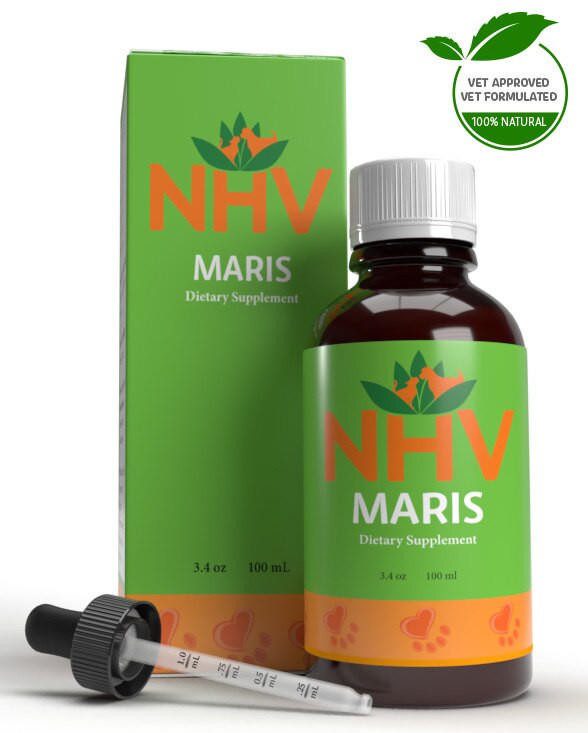
Natural Remedy for Cat Constipation
buy 2 and save $3
3 month supply for a small to medium size pet

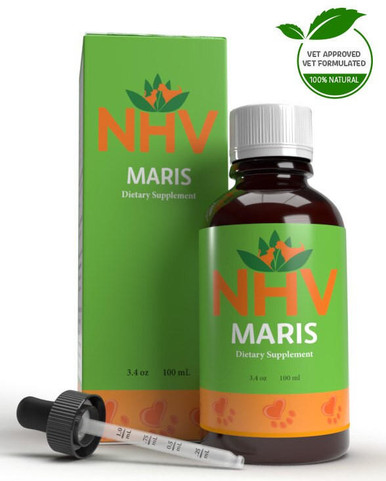

What to do for a cat with constipation? It can be a real messy situation, and long term constipation can cause serious health issues for your cat including megacolon in cats. You can help relieve your cat’s constipation with natural remedies formulated by vets. Promote healthy bowel movements with Maris, a gentle, herbal supplement that will soothe your pet’s intestines, soften stools, and help relieve cramps and gas.
Constipation occurs when a pet is unable to evacuate his or her bowels. When this occurs, water from fecal matter is absorbed by the colon, leaving a hard mass that is uncomfortable to pass.
Constipation may be caused by poor hydration or a dirty litter pan. Start by ensuring that your cat has easy access to clean drinking water and a clean litter box. Diet is another common factor. They may have ingested animal bones or other indigestible materials, like hair, certain plants, or litter.
Other possible causes may include:
Constipation may be a sign of a more serious condition, such as inflammation of the colon, called colitis. If your kitty’s constipation is recurring, it’s important to schedule a visit with your vet to rule this out.
Maris is an effective remedy to soothe the discomfort and symptoms of constipation naturally. Maris is a gentle herbal formula that can be used long term if your kitty suffers from constipation. For immediate, emergency relief of constipation please see your vet. All NHV supplements are ethically sourced or wildcrafted. They’re formulated by a holistic veterinarian to support your cat’s overall health. Have your cat try Maris and see the difference for yourself.
If your kitty is suffering from chronic constipation, ask your vet to show you how to palpate for constipation. This little trick along with supplements can save you a trip to the vet’s since it can help ease constipation before it gets too severe.
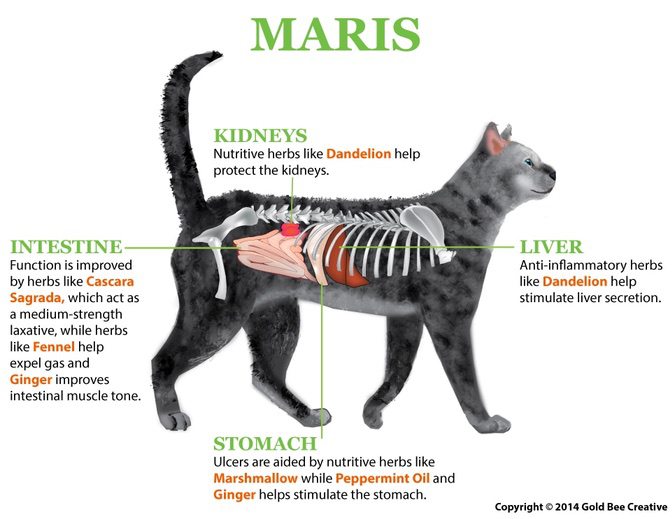
Cascara Sagrada – A medium-strength laxative that restores intestinal tone and muscle activity without cramping.
Marshmallow – Controls bacterial infection and soothes and softens irritated tissue. It has a soothing lubricating effect on the intestine.
Fennel – Relieves stomach cramps and reduces gas production.
Eleuthero – Reduces fatigue and leaves your pet feeling more energetic.
Dandelion – A vitamin-rich laxative that protects the liver and improves digestion. It also has anti-inflammatory properties.
Ginger – An antispasmodic and anti-flatulent that improves peristalsis and intestinal muscle tone.
Peppermint Oil – Relieves spasms, improves digestion, and helps your pet eliminate gas.
Select your pet's weight to determine the correct dose.
To be taken twice daily. Determine your pet’s weight and then use the easy chart below to determine the correct dose. This is the minimum dosage.
Pet's Weight Dosage
0 - 15 lb = 0.5 ml
16 - 30 lb = 1.0 ml
31 - 45 lb = 1.5 ml
46 - 60 lb = 2.0 ml
61 - 75 lb = 2.5 ml
Over 75 lb = 3.0 ml
How to Administer
Shake well before use. The easiest method is to use the dropper provide and places the drops into your pet’s food or favorite treat. You can also use the dropper and squirt directly into the pet’s mouth.
Some pets can be finicky, if this occurs consider hiding the drops in foods most pet’s love such as fish, chicken or yogurt or a favorite treat. If your pet only eats dry food then soak a few kibbles at feeding time.
For Best Results
Herbal dietary supplements are beneficial to the health and wellbeing of your pet and are safe for long-term use. Every pet responds to natural herbal supplements differently, therefore it is important to be consistent and administer the product daily. Supplements generally take two to four weeks to take effect, however this will vary from one animal to the next.
Product Storage
All NHV Natural Pet Products are pure herbal extracts and contain no artificial additives, preservatives or coloring. Shelf life after opening is 6 months and must be refrigerated after opening.
Cautions and Contraindications
Do not use Maris in pregnant or nursing animals. Do not use with intestinal obstructions. Speak to your vet before using our products. A second visit is recommended if your pet’s condition does not improve, or deteriorates after continued use of the supplements.
All information provided by NHV Natural Pet Products is for educational purposes only.
What to do for a cat with constipation? It can be a real messy situation, and long term constipation can cause serious health issues for your cat including megacolon in cats. You can help relieve your cat’s constipation with natural remedies formulated by vets. Promote healthy bowel movements with Maris, a gentle, herbal supplement that will soothe your pet’s intestines, soften stools, and help relieve cramps and gas.
Constipation occurs when a pet is unable to evacuate his or her bowels. When this occurs, water from fecal matter is absorbed by the colon, leaving a hard mass that is uncomfortable to pass.
Constipation may be caused by poor hydration or a dirty litter pan. Start by ensuring that your cat has easy access to clean drinking water and a clean litter box. Diet is another common factor. They may have ingested animal bones or other indigestible materials, like hair, certain plants, or litter.
Other possible causes may include:
Constipation may be a sign of a more serious condition, such as inflammation of the colon, called colitis. If your kitty’s constipation is recurring, it’s important to schedule a visit with your vet to rule this out.
Maris is an effective remedy to soothe the discomfort and symptoms of constipation naturally. Maris is a gentle herbal formula that can be used long term if your kitty suffers from constipation. For immediate, emergency relief of constipation please see your vet. All NHV supplements are ethically sourced or wildcrafted. They’re formulated by a holistic veterinarian to support your cat’s overall health. Have your cat try Maris and see the difference for yourself.
If your kitty is suffering from chronic constipation, ask your vet to show you how to palpate for constipation. This little trick along with supplements can save you a trip to the vet’s since it can help ease constipation before it gets too severe.

Cascara Sagrada – A medium-strength laxative that restores intestinal tone and muscle activity without cramping.
Marshmallow – Controls bacterial infection and soothes and softens irritated tissue. It has a soothing lubricating effect on the intestine.
Fennel – Relieves stomach cramps and reduces gas production.
Eleuthero – Reduces fatigue and leaves your pet feeling more energetic.
Dandelion – A vitamin-rich laxative that protects the liver and improves digestion. It also has anti-inflammatory properties.
Ginger – An antispasmodic and anti-flatulent that improves peristalsis and intestinal muscle tone.
Peppermint Oil – Relieves spasms, improves digestion, and helps your pet eliminate gas.
Select your pet's weight to determine the correct dose.
To be taken twice daily. Determine your pet’s weight and then use the easy chart below to determine the correct dose. This is the minimum dosage.
Pet's Weight Dosage
0 - 15 lb = 0.5 ml
16 - 30 lb = 1.0 ml
31 - 45 lb = 1.5 ml
46 - 60 lb = 2.0 ml
61 - 75 lb = 2.5 ml
Over 75 lb = 3.0 ml
How to Administer
Shake well before use. The easiest method is to use the dropper provide and places the drops into your pet’s food or favorite treat. You can also use the dropper and squirt directly into the pet’s mouth.
Some pets can be finicky, if this occurs consider hiding the drops in foods most pet’s love such as fish, chicken or yogurt or a favorite treat. If your pet only eats dry food then soak a few kibbles at feeding time.
For Best Results
Herbal dietary supplements are beneficial to the health and wellbeing of your pet and are safe for long-term use. Every pet responds to natural herbal supplements differently, therefore it is important to be consistent and administer the product daily. Supplements generally take two to four weeks to take effect, however this will vary from one animal to the next.
Product Storage
All NHV Natural Pet Products are pure herbal extracts and contain no artificial additives, preservatives or coloring. Shelf life after opening is 6 months and must be refrigerated after opening.
Cautions and Contraindications
Do not use Maris in pregnant or nursing animals. Do not use with intestinal obstructions. Speak to your vet before using our products. A second visit is recommended if your pet’s condition does not improve, or deteriorates after continued use of the supplements.
All information provided by NHV Natural Pet Products is for educational purposes only.
overall health

Natures Immuno, Multi Essentials, PetOmega 3 & Ouch Away Spray
bundle and save with pet expert kits



Hair loss can occur for many different reasons, such as nutritional deficiencies, allergies, impairment of the immune system, infections, stress and more. This bundle of supplements contain many different beneficial properties, and they can work synergistically together helping to balance health issues which may be causing hair loss.
Each supplement to be taken twice daily. Determine your pet’s weight and then use the easy chart below to determine the correct dose. This is the minimum dosage.
Pet's Weight Dosage
0 - 15 lb = 0.5 ml
16 - 30 lb = 1.0 ml
31 - 45 lb = 1.5 ml
46 - 60 lb = 2.0 ml
61 - 75 lb = 2.5 ml
Over 75 lb = 3.0 ml
How to Administer
Shake well before use.The easiest method is to use the dropper provided and place the drops into your pet’s food or favorite treat. You can also use the dropper and squirt directly into the pet’s mouth. Some pets can be finicky, if this occurs consider hiding the drops in foods most pet’s love such as fish, chicken or yogurt or a favourite treat. If your pet only eats dry food then soak a few kibbles at feeding time.
For Best Results
Herbal dietary supplements are beneficial to the health and well-being of your pet and are safe for long-term use. Every pet responds to natural herbal supplements differently, therefore it is important to be consistent and administer the product daily. Supplements generally take two to four weeks to take effect, however this will vary from one animal to the next.
Product Storage
All NHV Natural Pet Products are pure herbal extracts and contain no artificial additives, preservatives or coloring. Shelf life after opening is 6 months and must be refrigerated after opening.
Cautions and Contraindications
Do not use in pregnant or nursing animals.
All information provided by NHV Natural Pet Products is for educational purposes only.
All information provided by NHV Natural Pet Products is for educational purposes only.
Select your pet's weight to determine the correct dose.
Ouch Away Spray can help to stimulate hair growth and Pet Omega 3 can help to heal and strengthen the skin to help hair to regrow.
This kit was formulated so that all supplements can be taken at the same time.
There are many factors that may be causing hair loss; endocrine disorders, allergies, skin conditions, over grooming and more.
Hair loss is different from regular shedding. All pets shed their fur regularly. If your pet has any noticeable, unusual bald or thinner patches of fur, this would be considered hair loss.
Hair loss can occur for many different reasons, such as nutritional deficiencies, allergies, impairment of the immune system, infections, stress and more. This bundle of supplements contain many different beneficial properties, and they can work synergistically together helping to balance health issues which may be causing hair loss.
Each supplement to be taken twice daily. Determine your pet’s weight and then use the easy chart below to determine the correct dose. This is the minimum dosage.
Pet's Weight Dosage
0 - 15 lb = 0.5 ml
16 - 30 lb = 1.0 ml
31 - 45 lb = 1.5 ml
46 - 60 lb = 2.0 ml
61 - 75 lb = 2.5 ml
Over 75 lb = 3.0 ml
How to Administer
Shake well before use.The easiest method is to use the dropper provided and place the drops into your pet’s food or favorite treat. You can also use the dropper and squirt directly into the pet’s mouth. Some pets can be finicky, if this occurs consider hiding the drops in foods most pet’s love such as fish, chicken or yogurt or a favourite treat. If your pet only eats dry food then soak a few kibbles at feeding time.
For Best Results
Herbal dietary supplements are beneficial to the health and well-being of your pet and are safe for long-term use. Every pet responds to natural herbal supplements differently, therefore it is important to be consistent and administer the product daily. Supplements generally take two to four weeks to take effect, however this will vary from one animal to the next.
Product Storage
All NHV Natural Pet Products are pure herbal extracts and contain no artificial additives, preservatives or coloring. Shelf life after opening is 6 months and must be refrigerated after opening.
Cautions and Contraindications
Do not use in pregnant or nursing animals.
All information provided by NHV Natural Pet Products is for educational purposes only.
All information provided by NHV Natural Pet Products is for educational purposes only.
Select your pet's weight to determine the correct dose.
Ouch Away Spray can help to stimulate hair growth and Pet Omega 3 can help to heal and strengthen the skin to help hair to regrow.
This kit was formulated so that all supplements can be taken at the same time.
There are many factors that may be causing hair loss; endocrine disorders, allergies, skin conditions, over grooming and more.
Hair loss is different from regular shedding. All pets shed their fur regularly. If your pet has any noticeable, unusual bald or thinner patches of fur, this would be considered hair loss.
Published: July 20, 2015